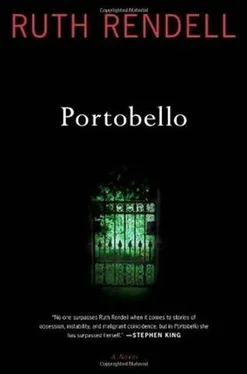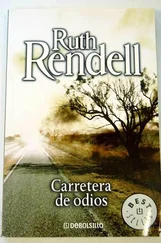He could never have said he had been touched or moved by this gesture of Maybelle's. It was a sign, that was all. The film seemed to be holding her interest entirely. She gazed at the colourful activities of Elizabeth's court with rapt attention, her mouth slightly open. It was possibly many years, Uncle Gib thought, since Reuben Perkins had taken her to the pictures. Most likely he, Gilbert Gibson, would never take her again once they were married.
The film held no attractions for him. Films hadn't in the days when he was courting Ivy. Reality was the thing, as far as he was concerned, and the rest of the world could keep their stories, their fantasies and their dreams. All he really wanted was a cigarette but lighting one would lead to an argument, a row and eventually his forcible removal. His mind moved purposefully on to a practicable future, free of speculation and baseless hopes. When his house in Blagrove Road was finished he would let it out in flats. It would make three fine apartments. Uncle Gib grew almost dizzy at the prospect of the money he could make in rents and when he let out a sort of gasp Maybelle thought it signified his enjoyment of Cate Blanchett's performance and she squeezed his hand.
The fireworks reminded Eugene of his own childhood when you had been able to buy rockets and Catherine Wheels and Prince of Wales Feathers without age restriction and no one tried to stop seven-year-olds setting them off themselves. He had bought his off a stall in the Portobello Road between Cambridge Gardens and Chesterton Road a long way up from his father's shop. It was from somewhere up there that these seemed to be coming, red and dazzling white sparks falling in showers over those streets, Talbot Road, Golborne Road and Powis Square which, in his youth, his mother told him to keep away from. They were infested (her word) with hippies and flower people and immigrants from good- ness knows where. Now the hippies had grown old or died and the immigrants' children were respectable executives who owned smart houses in those same streets with fuchsia and taupe front doors and window boxes full of petunias.
He watched the fireworks from his bedroom window, wondering at himself for doing something so unlikely. But now almost everything he did was out of character from this harking back to the past to staying in every evening, mooning dismally about what might have been. He turned away. The pyrotechnics were over. Whoever had produced this display had run out of rockets. Eugene went downstairs wondering what nasty ready meal to take out of the freezer or if just not to eat at all might be the better option. It was strange, all of it, inexplicable, because when Ella had been here with him it was mostly he who did the cooking. In his drinking days he would have got through a bottle of wine instead and in the Chocorange era consumed a packetful. He was standing in the kitchen thinking how pointless it was to eat if you were not hungry when the doorbell rang.
On Hallowe'en, he had answered the door to three teenagers who, when he refused them money and told them to go away, threatened to break his windows. Far from being intimidated, he had said he was calling the police and picked up his mobile. They had fled, he pursuing them to the gate. Since then he had made it a rule never to answer the door after dark unless he expected a caller, and the dark came very early now. But there had been no callers. He went up to the drawing room window from which he could see the front path, though not the porch and doorstep. The bell rang again.
He waited. Whoever it was had given up. Down the dark path a woman was walking away. She turned her head to look back and he saw it was Ella. He ran to the door and flung it open.
In a manner quite unlike him he shouted, 'Ella!'
'Gene,' she said and she took a few steps towards him.
He gasped, 'Come in. Please do come in. Don't go away.'
'All right. I won't.'
They confronted each other in the hall and Eugene closed the door. Ella looked back at the door as if things were moving faster than she wanted.
'Take your coat off, please. Please let me take your coat.'
'I didn't mean to stay.'
'Oh, Ella, Ella,' he said, his voice full of longing.
'I came to ask you to go to the police.'
'To do what ? Don't stand there, not here, come in. Please come in.'
She walked ahead of him into the drawing room but hesitantly as if she had never been there before. At a loss for words, he simply gazed at her. Like him, she had lost weight and, like him, she looked distraught, disorientated, shattered. He closed the door, opened it again and ran out into the hall where he bolted the front door, came back, his hands spread in a despairing gesture.
'What are you doing?'
'I don't know. Shutting you in, I think. Making you my prisoner.'
She did the only thing which, at that moment, could have made him happy. She began to laugh. A moment of stillness passed and then his arms were round her and she was pressed closely against him.
'I have been the most monstrous fool,' he said, 'but I don't think I've done anything against the law, have I?'
'Against the law? Oh, I see. Me asking you to go to the police, you mean.' She pulled him on to the sofa and, still holding him, told him about Lance Platt, and the fire and Gemma.
'Oh, yes, I saw him,' Eugene said. 'It was your birthday, it was one o'clock in the morning. And what's more I saw the first flames go up from that burning house at the same time. I'll go to the police tomorrow.'
'Let's go now, Gene.'
'Oh, my darling, anything, anything you want, we'll go anywhere as long as you'll promise to come back here with me and never go away again.'
Neither of them, then or later, said a word about sugar-free sweets, though next day when he had left for the gallery Ella searched the house and satisfied herself that no more had been bought to replace those she had burnt in the garden. She went through the pockets of all his coats and jackets, finding nothing but laughing at the thought of hunting for Chocorange where another woman might look for love letters.
But that evening Eugene unbolted the door, they put on coats it was too mild to need and walked hand in hand across the Portobello Road past the Earl of Lonsdale, along Kensington Park Gardens and so to Ladbroke Grove where stands the imposing and rather grand police station.
The presence of Lance Platt in Chepstow Villas on the night of 14 September was never connected with the theft of Elizabeth Cherry's jewellery. No one told him why not and enquiring about it could lead to no good. It wouldn't only be sticking his neck out. Elizabeth's insurance company had paid up and Ella, the only person to be told about it, had completely forgotten that aspect of Gemma's story.
As soon as his alibi was accepted and he was released from prison, Lance moved in with Gemma. She nagged him so much about his work-free state that this time, instead of hitting her, he got a job. At the next interview he was offered as a Jobseeker he behaved properly, answered politely and said thank you very much when offered a position as assistant in a cut-price hardware shop in the Portobello Road. The owner pays less than the minimum wage, which is illegal, but he tells Lance that if he doesn't like it there will be plenty of people from Romania and Bulgaria who will.
A new house has been built at the end of Blagrove Road but Uncle Gib, as he had foreseen, has never moved into it. After waiting a decent interval of six months, he and Maybelle were married in the church of the Children of Zebulun and held their reception in the Fat Badger. Uncle Gib has become the new Shepherd of the Children of Zebulun and is deeply respected by his congregation. The pressure of work is heavy and he has had to give up his Agony Uncle activities but much of what he used to say he preaches about from the pulpit. The new house has a bathroom on each floor and each floor is let as a separate flat. The area is prestigious and Uncle Gib charges accordingly. He tells prospective tenants, demurring at exorbitant rents, that if they don't like the heat to get out of the kitchen.
Читать дальше











